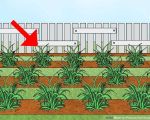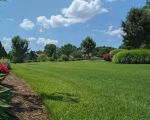1. The Importance of Mulching for a Healthier Lawn
As a passionate gardener, I’ve learned that mulching is one of the most effective ways to promote a healthy, vibrant lawn. When I first started caring for my lawn, I was often puzzled by how to maintain a lush and green yard, especially during dry spells. After discovering the benefits of mulching, I’ve seen a significant improvement in both the health and appearance of my lawn. In this article, I’m going to share my experience and explain how mulching can help transform your lawn into a healthier, more resilient outdoor space.
2. What is Mulching and How Does it Work?
Mulching involves applying a layer of organic or inorganic material, such as grass clippings, leaves, straw, or wood chips, to the surface of your lawn. This layer serves as a protective cover for the soil beneath, offering numerous benefits. The mulch helps retain moisture, suppress weeds, and enrich the soil over time. It essentially acts as a natural barrier that keeps the soil cool during the hot summer months and prevents it from drying out too quickly. For me, the first time I mulched my lawn, I noticed how much less I needed to water it, especially during periods of little rain. It was an eye-opening experience.
3. How Mulching Improves Lawn Health
Mulching has a wide range of benefits that directly contribute to the health of your lawn. Here are the top ways that mulching can improve your yard:
- Moisture Retention: Mulch helps the soil retain moisture, which is especially important during dry seasons. I’ve seen a reduction in the frequency of watering needed for my lawn after applying a layer of mulch. It helps keep the grass hydrated, even when it hasn't rained in a while.
- Weed Control: One of the most frustrating aspects of lawn care is dealing with weeds. Mulch forms a barrier that prevents sunlight from reaching weed seeds, thus inhibiting their growth. Since I started mulching, I’ve noticed far fewer weeds, and the ones that do sprout are much easier to pull up.
- Soil Enrichment: Organic mulches break down over time, adding valuable nutrients to the soil. This process helps improve soil structure and encourages the growth of beneficial microorganisms. As the mulch decomposes, it creates a rich, fertile environment that nourishes the roots of my grass, promoting healthy growth.
- Temperature Regulation: Mulch acts as an insulator, helping to regulate the temperature of the soil. During the summer, it keeps the soil cooler by blocking the sun, while in winter, it helps keep the ground warmer. This regulation of temperature ensures that the roots of your grass stay healthy throughout the year.
4. The Environmental Benefits of Mulching
In addition to improving the health of your lawn, mulching offers several environmental benefits that I didn’t fully appreciate until I started using it regularly. Mulching is an eco-friendly way to enhance your yard because it helps conserve water, reduces the need for chemical fertilizers, and prevents soil erosion. The organic materials used for mulching are often byproducts from other lawn care activities, like grass clippings or leaves. By recycling these materials, I’m reducing waste and making my lawn care practices more sustainable. For those who are environmentally conscious, mulching is a fantastic way to take care of your lawn without relying on synthetic chemicals.
5. Choosing the Right Mulch for Your Lawn
When I first started mulching, I was unsure about which type of mulch to use. After experimenting with various options, I’ve learned that choosing the right mulch is key to getting the best results for your lawn. There are two main types of mulch to consider: organic and inorganic. Organic mulches, such as grass clippings, leaves, straw, or wood chips, are the best option for most lawns. They break down over time, enriching the soil and adding nutrients that support healthy grass growth. Inorganic mulches, such as rubber or stone, do not decompose and are typically used in decorative applications, but they do not offer the same soil benefits.
When choosing organic mulch, I recommend using materials that are locally sourced and free from pesticides or chemicals. This ensures that you’re not introducing harmful substances into your soil, which could negatively affect the health of your lawn in the long term.
6. How Often Should You Mulch Your Lawn?
How often you mulch your lawn depends on several factors, including the type of mulch used and the climate in your area. In general, I apply a fresh layer of mulch to my lawn once or twice a year. The best time to mulch is in the spring, when the grass is starting to grow, or in the fall, when the weather cools down. Applying mulch in the spring helps retain moisture and protects the soil as the weather warms, while mulching in the fall adds insulation for the winter months. If you live in a region with harsh winters or hot summers, mulching can help buffer these extreme conditions and keep your lawn healthy year-round.
7. My Personal Experience with Mulching: A Success Story
I can vividly remember the first year I mulched my lawn. I had always struggled to keep the grass green and healthy, especially in the dry summer months. I decided to try mulching after hearing about its benefits from a friend, and I was amazed by the results. The grass not only looked greener and more vibrant, but I also noticed that I didn’t have to water it as often. The weeds were significantly reduced, and the soil felt richer and more fertile. My neighbors even commented on how great my lawn looked. This experience showed me just how powerful mulching can be for improving the health of your lawn and making lawn care easier and more sustainable.
8. The Bottom Line: Mulching is Key to a Healthy Lawn
Mulching is one of the best investments you can make for your lawn’s health. It offers a variety of benefits, from moisture retention to weed control to soil enrichment. By mulching regularly, you’re not only enhancing the appearance of your lawn but also promoting a healthier, more sustainable environment. Whether you’re an experienced gardener or a beginner, mulching is an essential practice for creating a thriving, lush lawn. If you’re looking to improve your lawn’s health and reduce the time spent on maintenance, I highly recommend giving mulching a try!








